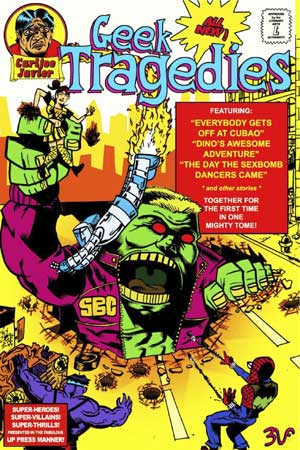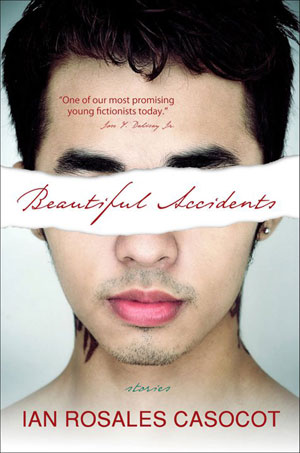In the wee hours of May 20, online merchant Amazon reached a new milestone in its business: for the first time since launching its eBook reader Kindle in 2007, sales of eBooks have outpaced that of its print books. Amazon said that for every 100 print books it sells, a total of 105 eBooks are delivered to owners of Kindle the world over. Amazon Founder and CEO Jeff Bezos noted that they've been selling print books online for 15 years, and Kindle books for only less than four years. The Amazon feat only shows that more and more, voracious readers are turning to digital versions of their favorite books to get their literary fix. And who wouldn't? EBooks are cheaper, are more flexible and are more portable. All one needs is a device on his hands, and he's good to go. Around this time last year, several local book publishers had gathered in a conference to discuss the future of the book—a future where ink is replaced by pixels, and paper by an aluminum enclosure and LCD display.

'Geek Tragedies' by Carljoe Javier is one of ten handpicked titles that will be converted and distributed worldwide in digital format.
But what they discussed during the conference isn't nearly as intriguing as the crucial timing of the event: just 9 months before the conference, Apple launched its phenomenal iPad tablet device, which created ripples of change in many industries, the publishing business chief among them. A full year hence, some of these publishers have slowly started paving the way for the industry's future. Next week, in time for the 32nd Manila International Book Fair, Vibal Foundation, one of the publishers which participated in last year's conference, will be launching Vibe, its own version of the Amazon Kindle Store. On Thursday, meanwhile, the University of the Philippines (UP) Press led the charge with its announcement of the digital versions of some of the press's titles, which are now available on Amazon.
Breaking barriers Carljoe Javier, special project officer for digital and online marketing of the UP Press, said their move is basically a response to the ongoing transition of the industry to digital publishing. "We believe that UP Press titles are of global quality, but we get limited by distribution. We get limited by shipping costs [as well as] printing costs," Javier told GMA News Online. With a five-year partnership with Flipside Digital Content Co. Inc., officials of the UP Press handpicked 10 academic and literature titles, both old and fairly recent, for conversion and distribution worldwide in digital format. These titles include:
- Beautiful Accidents by Ian Rosales Casocot
- Geek Tragedies by Carljoe Javier
- A History of the Philippines by Samuel K. Tan
- Revisiting Usog, Pasma, Kulam by Michael L. Tan
- Surgeons Do Not Cry by Ting Tiongco
- Damaged People by Karl R. De Mesa
- Fourteen Love Stories by Jose Dalisay Jr. and Angelo R. Lacuesta
- Philippine Postcolonial Studies: Essays on Language and Literature by Cristina Pantoja
- Hidalgo and Priscelina Patajo-Legasto
- The Gaze by Arvin Abejo Mangohig
- Hairtrigger Loves: 50 Poems on Woman by Alfred A. Yuson
Javier said that these titles would go at a slightly cheaper price than their print counterparts. "For example, the print version of my book is P250. In digital, it's $4.99," he said. At the moment, the books are available via the Amazon Kindle Store, but Javier said they are already in talks with other digital storefronts such as Apple and the Barnes and Noble bookstore. It's possible, he added, that readers would find the same titles in upcoming local eBook storefronts, such as the Vibe bookstore which will be launched soon by Vibal. "We do not close our doors to possible distribution opportunities," he said. The long-term goal, according to Javier, is to convert all of the press house's titles into digital format. "But for the moment, were taking it slow, seeing how things go," he said, noting how there are more than 20 books on his desk right now where they would have to choose the next 10 titles to digitize. "But as far as academic publishers are concerned, we're the first [to do this]," he claimed.
Wider reach Himself a published author, Javier said that with the transition to digital, the barrier for book availability has now been torn down, which is good news for writers.

'Beautiful Accidents' by Ian Rosales Casocot
"It's no longer an issue that some books are only available in certain countries. Or that the bookstore has sold out of copies. For authors, it means they don't have to compete with other titles for bookshelf space any longer," he said. Publishing in digital format means the playing field for authors has been leveled further. "When you go to Amazon and you do a search, tabi-tabi na kayo sa bookshelf ng lahat ng libro. It's a fair game," he said. "The problem before was, for example, I'm a Filipino writer who did a print run of 1,500 copies of my book, sa Pilipinas lang siya nadidistribute," he added. By publishing in a platform that is global, Javier said local authors now have the opportunity to get a wider range of audiences, not only in the Philippines but also in other countries. "Right now, even if you target 10 percent of the Philippine population, you are not guaranteed that most of them will buy," he stressed. "But how many users are on Amazon? If you can get 1 percent or 2 percent (of users) from Amazon, that's still a much larger readership than what you would get with a 1,000-copy print run."
Protecting intellectual rights Asked how the UP Press is viewing the problem of piracy—an issue that has long beset other industries which have transitioned to the digital format, such as the music and movie industries—Javier said they cannot do anything about it. "Piracy is piracy, it's going to happen [eventually]," he nonchalantly said. "If they want to pirate you, they're going to pirate you. It's that simple." He noted, however, that with their efforts to make the act of buying the book easier and more convenient for people, they are hoping to create an "enlightened readership." "With what we're doing, it's going to be a lot easier to buy the book itself than spend a lot of time looking for a torrent file of the book, getting it in PDF format, then converting it into a format readable by your device," he explained. "With the amount of time that you spend pirating it and going through all that effort, you can just buy the book. It's the same thing. You paid for the time spent, anyway," he added. The right combination of an enlightened readership, fair prices and easy access to book downloads—three factors which are present in current eBook offerings—will become the tipping point wherein readers would eventually embrace and patronize digital versions of local books. "[With those present], then piracy [of eBooks] is not a great option," he added.
— TJD, GMA News 






